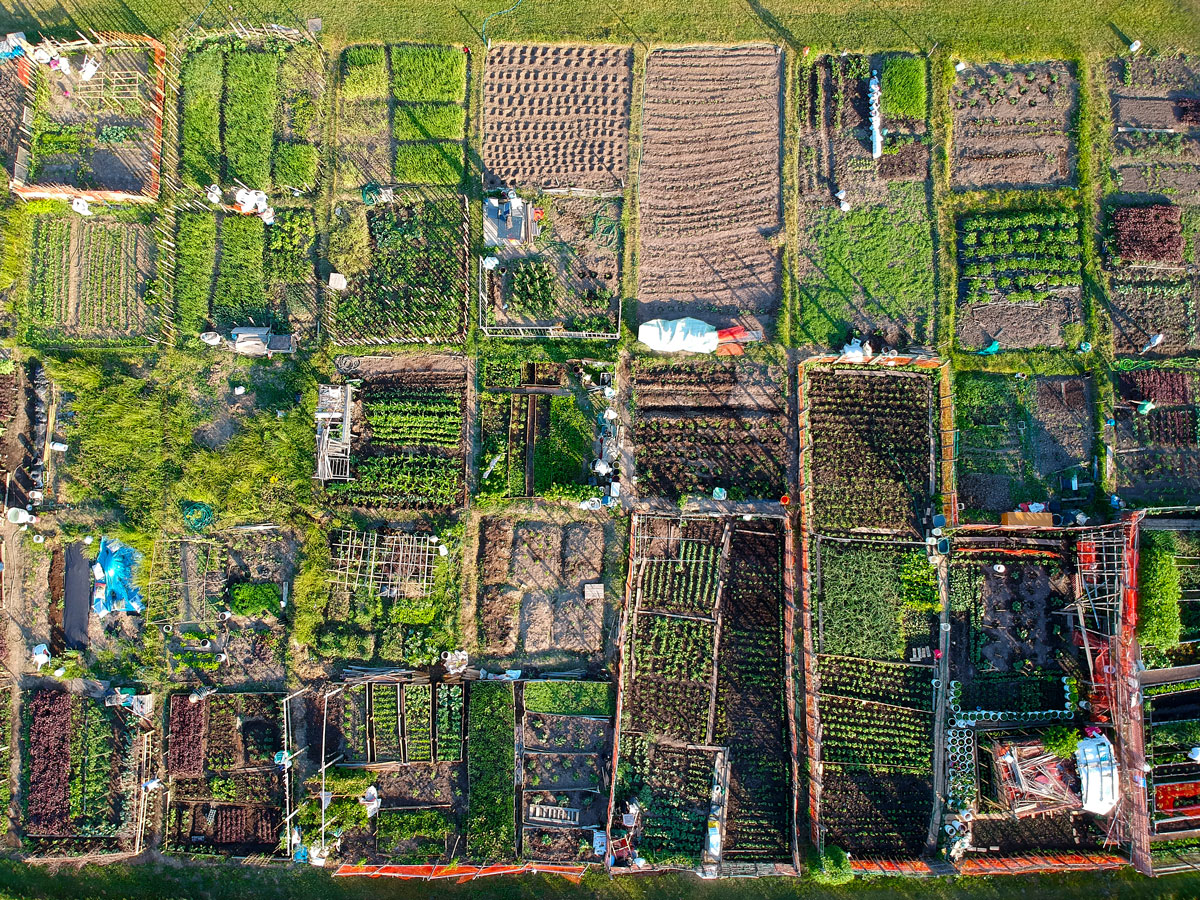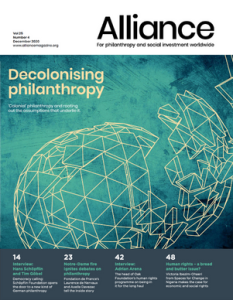The reasons for the breakdown of our food systems are complex and interlinked. Though exacerbated by present day conflicts, the current global food crisis is a product of how our food and agriculture systems have developed over the past 70 years – in part thanks to the funding support of philanthropic institutions and the broader donor community.
The wealth accumulated by many philanthropies has been generated through periods of colonization. For foundations committed to equity, exploring how to decolonize their operations and food systems investments should be top of mind. Funding decisions based on colonial mindsets and outdated approaches to evidence often end up perpetuating dominant yet false food systems narratives, which, among other negative impacts, has led us into global food crises.

Urban gardening. Photo credit: Shutterstock
Since the end of the Second World War, the way we grow food has been dependent on fossil fuel-based fertilizers, chemical pesticides, and high-yielding crop varieties. At first, these technologies were lauded as silver bullet solutions to mounting concerns of population growth and food insecurity. However, the evidence supporting this kind of approach has since been debunked, its long-term adverse impacts laid bare. Yet the industrial model of food and agriculture it introduced remains dominant.
The outcome is program and policy priorities that continue to advance extractive and unsustainable methods of food and agriculture production perpetuating high-risk food systems controlled by profit-driven multinationals. It’s an approach that’s supported, directly or indirectly, by major international funders, donors, and agricultural development institutions through to this day.
In 2021, the Global Alliance for the Future of Food set out to better understand how agroecology, regenerative approaches, and Indigenous foodways could transform food systems in a sustainable, equitable way – and why these approaches are often overlooked in favour of conventional, industrial models.
Engaging 17 contributing teams representing geographic, institutional, sectoral, gender, and racial diversity, The Politics of Knowledgecompendium found that colonial mindsets remain dominant in food systems funding. Philanthropic foundations make decisions based on the evidence available. But the type of evidence that is collected and considered is limited in scope and intrinsically connected to power and privilege.
A prime example is the English language bias. Our research found that while philanthropic institutions fund initiatives around the world, they tend to narrowly focus on evidence that is published in English. This excludes a substantial body of evidence – much of it from the Global South.
Power and privilege again come into play through hierarchies of evidence types. In Western science, certain expertise and scientific disciplines are elevated over others. Meanwhile peer-reviewed academic journals – while a verified and important source of information – are outlets available to few. Direct experience shared through oral accounts, stories, unpublished reports, and farmer and Indigenous knowledge are not regarded with the same legitimacy, even when results on the ground have been proven for years, decades, or centuries longer.
As we heard from collaborators around the world, many benefits of agroecology and regenerative approaches are difficult to quantify because they are comprehensive, long-term processes that reap a range of place-based benefits. Easily quantifiable data is often given preference over these more complex systems dynamics that are harder to assess and more qualitative in nature.
Compounded, language biases and overlooked evidence types result in a huge pool of critical evidence that is overlooked by decision-makers and are therefore unaccounted for. At a time of great crisis, the philanthropic community needs to be more inclusive and critical of the types of evidence we choose to legitimize. For foundations committed to equity and exploring how to decolonize their operations, starting with reviewing how your organization uses and funds research could be an area for immediate action.
Alongside contributors, we identified several recommendations on how to get started on this important work. Here are three ways funders can take action:
- Broaden your view of what counts as evidence. Without long-term, diverse evidence we will see the continuation of solutions that lack context and can have potentially harmful, unintended consequences. For philanthropic foundations, demanding that groups use narrowly focused metrics and evidence to apply for funds can be exclusionary and fail to recognize the diverse ways in which knowledge has been gathered, shared, and acted on.
- Consider environmental, political, economic, and social factors when funding. A key reason that agricultural investments fail to address hunger and malnutrition is because of their narrow focus on production and increasing crop yields. It’s crucial to fund interventions that take into account broader food systems dynamics such as distribution of resources, post-harvest handling and food distribution, access to land, political strife, inequality, and climate change.
- Seek initiatives that bring together diverse actors. It’s vital to convene farmers, researchers, policymakers, donors, consumers, and other food systems actors. By creating an open and safe space to discuss reciprocity, equality, justice, and power, philanthropic institutions can contribute to the democratization and decolonization of research. This includes supporting peer-to-peer exchanges, participatory action research, and Indigenous People, women and youth in decision-making processes.
In the months ahead, the Global Alliance for the Future of Food will be convening a group of diverse parties to discuss how to take forward the lessons from The Politics of Knowledge compendium. With the backing of our over 30 members, the findings will shape the Global Alliance’s strategic direction for collaborative and transformational research and guide our efforts to decolonize our food systems work and investments.
The evidence in support of agroecology, regenerative approaches, and Indigenous foodways exists in a battleground of competing interests and power structures. The politics of knowledge all too often keep these approaches from being understood and adopted, even at a time when we need them the most.
For philanthropic institutions looking to further decolonize their own work, we urge you to review the abundance of reports, studies, and literature reviews, including the work published through this collaborative effort.
We hope you’ll find what we did when we undertook this collaborative review: inspiration and agenda-setting evidence of how agroecology, regenerative approaches, and Indigenous foodways can repair our relationship with nature, build climate resilience, and nourish our communities.
Lauren Baker is Deputy Director of the Global Alliance for the Future of Food. In 2021, the Global Alliance published The Politics of Knowledge, a compendium that involved 17 contributing teams from around the world. Learn more about those findings and recommendations for action here.
New issue: Decolonising philanthropy
 The word ‘decolonisation’ was coined to describe the withdrawal of colonial powers from territories they had occupied. What forms have decolonisation practices taken among foundations? Should philanthropy be making reparations? And what significance does decolonisation have for philanthropic institutions when they are geographically distant from the former colonies? These are among the questions to be explored in the latest issue of Alliance. Guest edited by Shonali Banerjee, Centre for Strategic Philanthropy, Cambridge University and Urvi Shriram, Indian School of Development Management.
The word ‘decolonisation’ was coined to describe the withdrawal of colonial powers from territories they had occupied. What forms have decolonisation practices taken among foundations? Should philanthropy be making reparations? And what significance does decolonisation have for philanthropic institutions when they are geographically distant from the former colonies? These are among the questions to be explored in the latest issue of Alliance. Guest edited by Shonali Banerjee, Centre for Strategic Philanthropy, Cambridge University and Urvi Shriram, Indian School of Development Management.
Subscribe today to read it!



Comments (0)